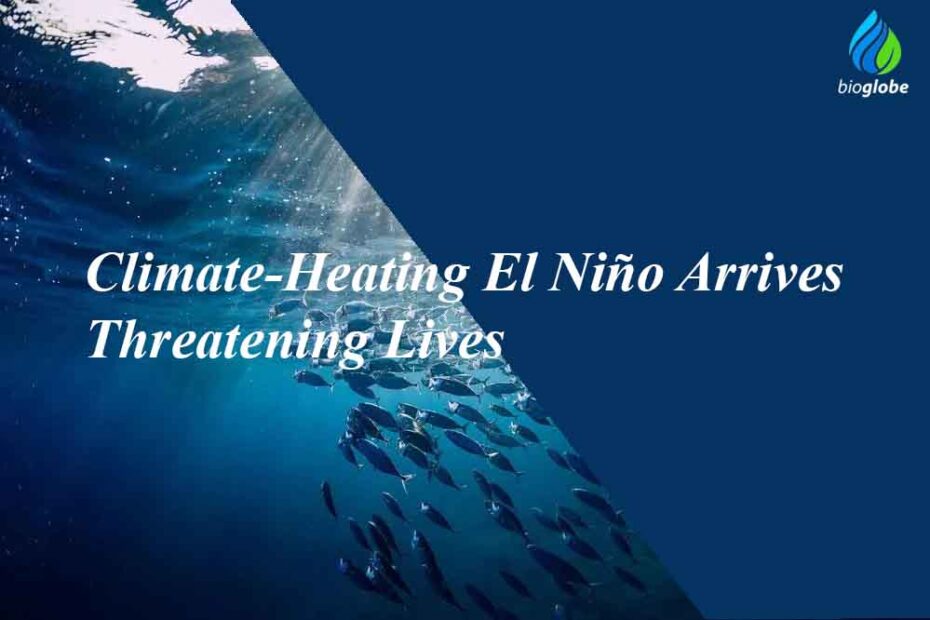Climate-Heating El Niño Arrives Threatening Lives
UN Warns of Record Temperatures and Extreme Heat
Introduction:
In a recent declaration, the United Nations’ World Meteorological Organization (WMO) has confirmed the arrival of a climate-heating El Niño event. As temperatures continue to rise globally due to human-induced carbon emissions, this development has been described as a “double whammy” by the WMO. The combination of El Niño and climate change can intensify extreme weather patterns, leading to potential risks for both lives and livelihoods. With temperature records already being shattered across the globe, the WMO emphasizes the need for preparedness to mitigate the impact of these impending weather events.
El Niño and Its Implications:
El Niño, the planet’s largest natural climate phenomenon, occurs due to variations in winds and ocean temperatures in the Pacific. This irregular switching between El Niño and its cooler counterpart, La Niña, affects billions of people worldwide. The current El Niño event comes as an addition to the ongoing global heating caused by human activities. The last major El Niño occurred in 2016, a year that still holds the record for being the hottest on record. Consequently, the WMO warns of the potential for more extreme weather events and temperature records to be broken, both on land and at sea.
Impact on Different Regions:
El Niño’s arrival signifies a higher probability of increased flooding in regions such as the southern United States, southern South America, the Horn of Africa, and central Asia. Additionally, severe heatwaves and droughts are expected to afflict eastern Australia, Indonesia, south Asia, and Central America. For instance, previous El Niño events have caused reduced rainfall in Uttar Pradesh, India, affecting water availability and the livelihoods of local villagers. These examples highlight the significance of understanding and preparing for the consequences of El Niño.
The Importance of Preparedness:
With a 90% probability of the El Niño event persisting until the end of 2023, the WMO calls for early warnings and anticipatory actions to protect lives and livelihoods. Petteri Taalas, the WMO secretary-general, emphasizes that governments worldwide must mobilize preparations to counteract the impacts of extreme weather events associated with this major climate phenomenon. Recognizing the potential for breaking temperature records and triggering more intense heatwaves, prompt action becomes crucial in mitigating the consequences.
The Climate Crisis Unfolding:
Recent months have already seen record-breaking temperatures worldwide. In the UK, June temperatures exceeded the average record by nearly a degree, while an unprecedented heatwave affected the country’s seas. Antarctica’s sea ice also reached a record low. Scientists emphasize that these events align with their predictions of the climate crisis rather than representing an unforeseen surge in global warming. Some experts even suggest that 2023 may become the hottest recorded year, with an even greater heat surge anticipated in 2024.
The Urgency of Addressing Climate Change:
A joint report by the WMO and the UK Met Office indicates a 66% chance of global annual temperatures surpassing pre-industrial levels by 1.5°C for at least one year before 2027. While this does not imply exceeding the long-term warming target specified in the Paris Agreement within the next five years, it serves as a stark reminder that efforts to limit the impacts of climate change are not yet on the right track. Chris Hewitt, the WMO’s director of climate services, stresses the need for urgent action to align with the targets designed to substantially reduce the adverse effects of climate change.
Conclusion:
The arrival of a climate-heating El Niño event, in combination with ongoing global heating, poses significant challenges for the planet. To safeguard lives and livelihoods, it is crucial for governments, communities, and individuals to recognize the importance of preparedness. Early warnings and anticipatory actions can help mitigate the impact of extreme weather events triggered by El Niño, which are likely to include record-breaking temperatures and intensified heatwaves. As we witness the climate crisis unfold, it becomes increasingly urgent to address the root causes of global warming and work collectively to limit its devastating effects.


